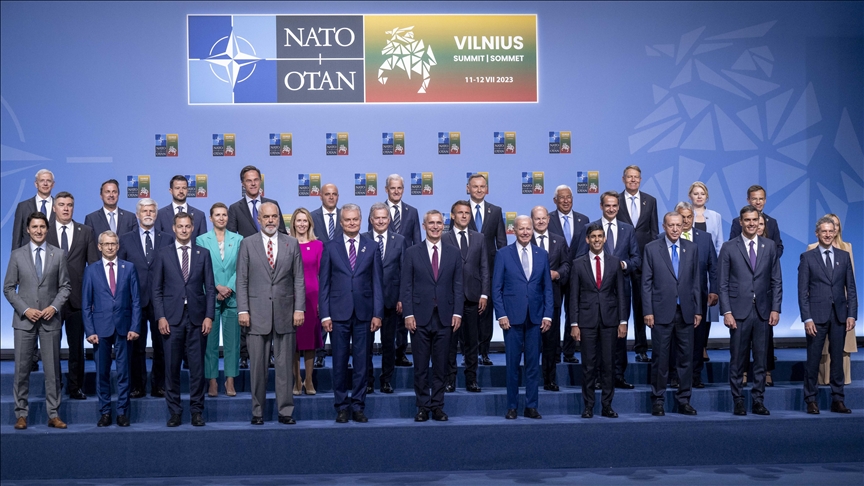 NATO Summit in Vilnius ( Aytac Unal - Anadolu Agency )
NATO Summit in Vilnius ( Aytac Unal - Anadolu Agency )
VILNIUS, Lithuania
While the NATO summit in Vilnius wrapped up with pledges of strong long-term support for Ukraine, the invitation that Kyiv most desired never materialized.
In President Volodymyr Zelenskyy’s own words, the outcome was “good” but not “optimum.”
Ukraine and Zelenskyy aside, the spotlight was firmly on Türkiye and President Recep Tayyip Erdogan.
As NATO chief Jens Stoltenberg said, the summit became historic even before it began, thanks to Türkiye’s nod to Sweden’s NATO accession, which cleared the way for the military bloc’s strategic objective of enlargement.
The allies also agreed to ramp up spending on defense, while delving into what Stoltenberg referred to as “the most comprehensive defense plans since the end of the Cold War.”
Türkiye takes center stage
A day before the summit kicked off, Erdogan, Stoltenberg and Swedish Prime Minister Ulf Kristersson sat down for talks in the Lithuanian capital.
The meeting ended with Türkiye saying it would forward Sweden’s NATO Accession Protocol to its parliament for ratification.
Sweden agreed to actively support efforts to reinvigorate Türkiye’s EU accession process, including modernization of the EU-Türkiye Customs Union and visa liberalization.
Stockholm also reiterated it will not support terrorist organizations such as the PKK and its affiliates, and FETO, the group behind the 2016 defeated coup in Türkiye.
Additionally, NATO announced it will appoint for the first time a special counterterrorism coordinator, while all sides agreed to work toward eliminating sanctions and removing obstacles in defense, trade and investments.
The agreement for Sweden’s NATO accession drew widespread praise for Erdogan and Türkiye, including from US President Joe Biden.
Hours after the deal, the US said it will move ahead with the sale of F-16 fighter jets to Türkiye, while Erdogan and Biden met on the sidelines of the summit for talks during which the Turkish president hailed the start of a “new process” with Washington.
In a tweet with a video of the meeting, Biden thanked Erdogan for his “courage, leadership, and diplomacy.”
Erdogan later told reporters on the presidential plane that his discussions with the US leader were “very fruitful,” adding that there was “a positive opinion” at the summit about the revitalization of Türkiye’s EU membership process.
“We will accelerate the negotiations for updating the Customs Union, which will have a multiplier effect on the Turkish economy. I believe that we will make progress in visa liberalization as well,” he said.
Ukraine’s NATO future
At the summit, allies reaffirmed that “Ukraine’s future is in NATO,” agreeing on a multiyear program to help transition Ukraine from Soviet-era to NATO standards and make its forces fully interoperable with the military bloc.
The assistance includes supporting Kyiv’s armed forces, upgrading the alliance’s political ties with a new NATO-Ukraine Council, and bringing Ukraine closer to NATO membership.
Allies also removed the requirement for a Membership Action Plan for Ukraine, reducing the steps Kyiv needs to take to become a member.
However, Stoltenberg made clear that no invitation would be issued during the summit.
“We will issue an invitation for Ukraine to join NATO when allies agree that conditions are met,” he said.
“This sends a clear, strong, and united message from our Vilnius summit.”
Just before the summit, Zelenskyy cut a frustrated figure as he said it would be “absurd” if Ukraine does not receive a timetable for its membership.
In Vilnius, he underlined that he wants both Kyiv and NATO to be “on the same page” regarding membership, hinting at differences between the two sides.
G-7 security guarantees
The Group of Seven (G-7) countries signed a joint declaration with promises to act multilaterally and on a country-to-country basis to offer Ukraine long-term security guarantees.
In the document, the US, UK, Japan, Canada, France, Germany and Italy pledged to support Ukraine by holding Russia accountable and ensuring that Moscow faces more sanctions and export controls.
They vowed more security assistance and modern military equipment, across land, air and sea domains, while prioritizing air defense and economic assistance.
They also underscored that “the security of Ukraine is integral to the security of the Euro-Atlantic region.”
The G-7 will “stand with Ukraine as it defends itself against Russian aggression, for as long as it takes,” read the joint statement.
According to the declaration, each member country committed to work with Ukraine on “specific, bilateral, long-term security commitments and arrangements” to bolster its military capabilities and strengthen its economic stability and resilience.
NATO’s defense and deterrence
NATO allies approved plans to ramp up defense spending, aimed at countering two main threats – Russia and terrorism.
The bloc aims to have 300,000 troops at high readiness, including substantial air and naval power.
NATO committed to invest at least 20% of its defense budget on major equipment, while allies vowed to invest a minimum of 2% of their GDP on annual defense expenditure.
The plan aims to accelerate joint procurement, boost interoperability, and generate investment and production capacity.
Only 11 allies out of 31 currently reach or exceed the 2% benchmark, Stoltenberg said, adding that NATO expects this number to rise substantially next year.
Anadolu Agency website contains only a portion of the news stories offered to subscribers in the AA News Broadcasting System (HAS), and in summarized form. Please contact us for subscription options.







